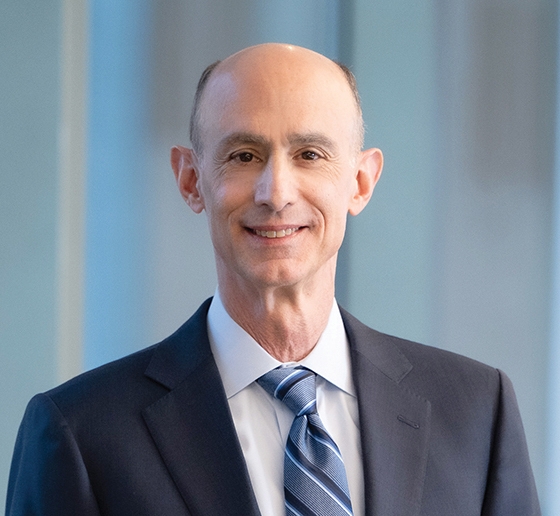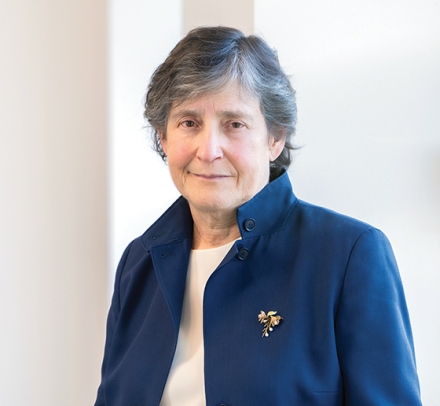David J. Greenwald ’83: A Paragon of Leadership
The co-chair of the Trustees of Columbia University, and chairman emeritus and of counsel of the law firm Fried Frank, is a recipient of Columbia Law’s 2025 Medal for Excellence.

As a leader in law, finance, and the nonprofit world, David J. Greenwald ’83 often sits at the head of the table. Sometimes, that is also the hot seat. But no matter the challenge or crisis, Greenwald approaches his work with a zeal for problem-solving and a strategic mindset.
A passionate supporter of the Law School, Greenwald serves on the Dean’s Council, participated in the Deals Workshop, and co-chaired his 30th, 35th, and 40th class reunions. His generous gifts to the Law School include endowing a scholarship, establishing the David J. Greenwald Professorship (currently held by Joshua Mitts), and an eponymous lounge in the new Law Library. “I love Columbia Law School,” he says. “It gave me a great foundation, and I give it credit for whatever success I’ve had in my career.”
For his service and exemplifying the qualities of character, intellect, and social and professional responsibility that the Law School seeks to instill in its students, Columbia Law presented Greenwald with the 2025 Medal for Excellence, its highest honor, along with fellow honoree Elizabeth Glazer ’86.
A Career in Three Acts
Greenwald enrolled at the Law School after earning a B.S. from the Wharton School at the University of Pennsylvania, where he had become interested in mergers and acquisitions. “I decided I’d pursue a career in M&A but as a lawyer instead of a banker,” he says. “I took classes with some legal giants at Columbia—Harvey Goldschmid, Hans Smit, Marvin Chirelstein, Willis Reese, to name a few—they were also fantastic teachers, and they taught me to think like a lawyer. I also took at least a couple of courses with John Coffee on securities law and what they called ‘regulation of the tender offer,’ which really accelerated my interest in M&A.”
Greenwald launched his career at Fried Frank during the M&A boom of the go-go ’80s. “There was an awful lot of activity. A lot of big deals got done. The work was really exciting, and you read about it on the front page of The Wall Street Journal,” he recalls. “I became a partner in 1990, which wasn’t a great year because the M&A business had fallen off a cliff, and I actually did a lot of bankruptcy work then.”
In 1994, Greenwald was offered the position of general counsel for Goldman Sachs’ private equity investment business. “The work sounded fascinating, and Goldman had a preeminent reputation, and I was pretty sure if it didn’t work out, Fried Frank would have me back,” he says.
“Goldman was a different culture,” he says. “In addition, I went from being a revenue producer to being a cost center, which is a cultural change in itself.” Through his work on several acquisitions, he got to know the people running the firm—Jon Corzine and Hank Paulson—and he “got involved with just about every crisis you can think of.” He was then named general counsel for the equities division that underwrote IPOs and traded equity securities, convertibles, and derivatives. “And then I became a participating managing director, which everybody calls a partner,” he says.
In 2006, Greenwald and his family moved to London, and he became Goldman’s international general counsel. “I had responsibility for everything outside the Americas—Asia, Australia, wherever,” he says. “It was a great experience both professionally and personally. Our family did a huge amount of traveling in Europe and Asia and went on a couple of safaris in sub-Saharan Africa.” Greenwald met his wife, Beth, who graduated from Georgetown Law, when they were summer associates at Hawkins Delafield & Wood. (“We’ve been married for 40 years, and that’s the most important thing that happened while I was in law school,” he says.) Their daughter Hilary Greenwald Ruffer is a 2017 graduate of the Law School, and their daughter Emily is a 2021 graduate of Columbia Business School.
The London years also coincided with the global financial crisis of 2007 to 2009. Greenwald was on his way back to London via New York after a business trip to Japan “when the world started coming apart,” he recalls. He never got on the connecting flight and ended up staying in New York for a month, working on the attempted rescue of Lehman Brothers and the investment by Berkshire Hathaway in Goldman Sachs. “I had just two suits with me,” he says.
Greenwald remembers toiling day and night. “The work was fascinating and very high-pressure in a very frightening environment because it looked like the financial system was at risk of collapsing, but it was super exciting.”
Shortly after the family moved back to New York in 2013, he got an unexpected call from Fried Frank. “The former chair and my M&A mentor, Arthur Fleischer, wanted me to come back to help run the firm,” says Greenwald, “and after some serious consideration, I accepted.”
When he became chair in 2014, Greenwald acted decisively and boldly. He streamlined and professionalized the management of the firm. He closed Fried Frank’s offices in Asia and Paris and restructured the London office. He articulated a new strategy to focus on Fried Frank’s core strengths in various corporate law practices and real estate. “The thinking was that we should do more of what we do well, fix what we have to do but isn’t working as well as it needs to, and not do anything else.”
Greenwald’s vision proved wildly successful for the firm, which now has 800 lawyers. “Over 10 years, we more than doubled revenue and nearly tripled profits, so it was a pretty good run,” says Greenwald, who stepped down as chair in February 2024.
Beyond Billable Hours
Greenwald has served on many nonprofit boards over the years, but he says that none have required more time and fortitude than his role as co-chair of the Board of Trustees of Columbia University, a position to which he was elected in 2023, along with Claire Shipman CC ’86, SIPA ’94, after serving on the board since 2018. One month after he and Shipman stepped into their roles in September 2023, the Israel-Hamas war began. “The world—and our campus—changed dramatically,” he says.
Greenwald drew on his leadership skills to help guide the university through the major challenges that followed. In April 2024, Greenwald was called to testify before the House of Representatives Committee on Education & Workforce about antisemitism at the university. Then, in August, University President Minouche Shafik resigned. “We had to find a new president … and help her get her footing,” he says. (Katrina A. Armstrong, the chief executive officer of Columbia University Irving Medical Center, has been the university’s interim president since August 2024.)
Meanwhile, Greenwald has kept up his other philanthropic commitments that include serving on the boards of The Legal Aid Society (chair, finance committee), Lenox Hill Neighborhood House (chair, audit committee), and Lincoln Center Theater (chair, audit committee). “I joined Lenox Hill Neighborhood House because I wanted to be involved in social services, which is completely different from what I’ve done for a living,” he says. “I joined the Lincoln Center Theater board because I love theater. I’m fascinated by how the theater works, how creative it is, how talented the actors and directors are, and what they are able to bring to the stage. It’s really quite incredible.”
Greenwald has a theory about why he’s been a successful nonprofit board member. “Corporate lawyers are used to bringing things to boards of directors and managing that process,” he says. “We like challenges, and we’re accustomed to dealing with difficult problems.”
